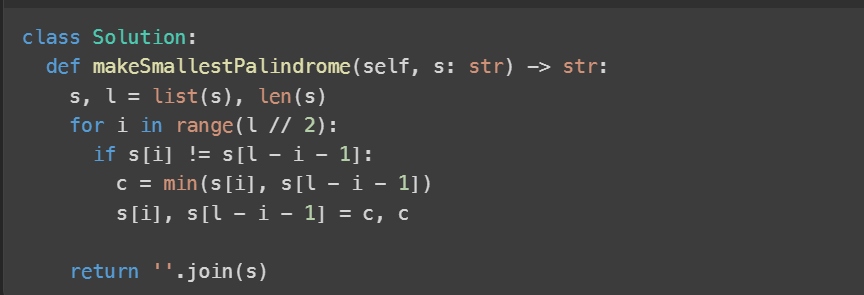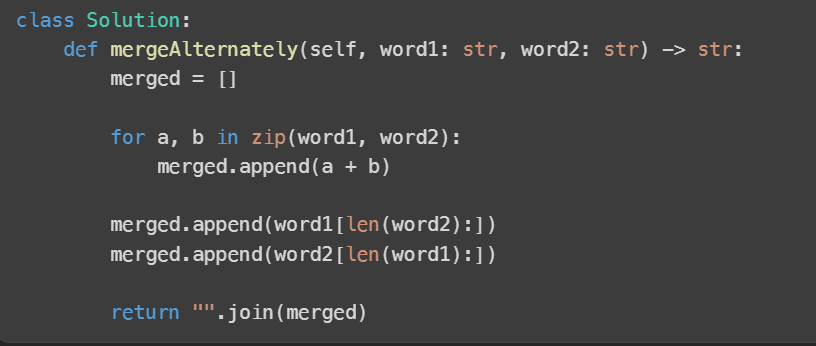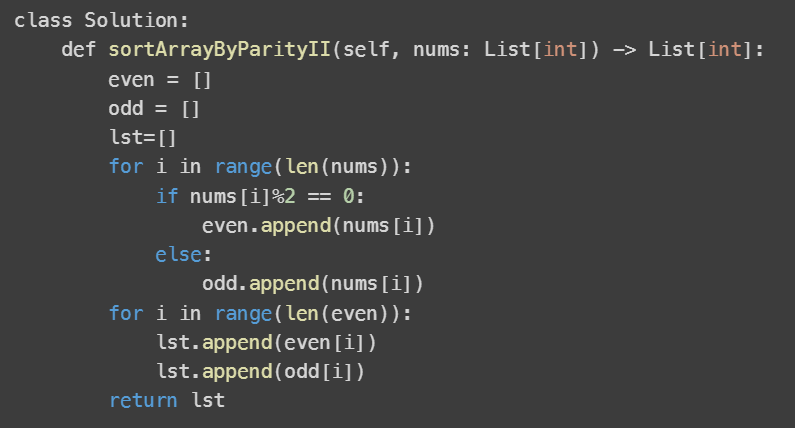Mastering Development in Python : Assignment 3 | Python- Mastering Development in Python - Software Development PDF Download
Q1: Given an array of strings words, return the first palindromic string in the array. If there is no such string, return an empty string "".
A string is palindromic if it reads the same forward and backward.
Example 1:
Input: words = ["abc","car","ada","racecar","cool"]
Output: "ada"
Explanation: The first string that is palindromic is "ada".
Note that "racecar" is also palindromic, but it is not the first.
Example 2:
Input: words = ["notapalindrome","racecar"]
Output: "racecar"
Explanation: The first and only string that is palindromic is "racecar".
Example 3:
Input: words = ["def","ghi"]
Output: ""
Explanation: There are no palindromic strings, so the empty string is returned.
Constraints:
1 <= words.length <= 100
1 <= words[i].length <= 100
words[i] consists only of lowercase English letters.
Ans: 
Q2: You are given a string s consisting of lowercase English letters, and you are allowed to perform operations on it. In one operation, you can replace a character in s with another lowercase English letter.
Your task is to make s a palindrome with the minimum number of operations possible. If there are multiple palindromes that can be made using the minimum number of operations, make the lexicographically smallest one.
A string a is lexicographically smaller than a string b (of the same length) if in the first position where a and b differ, string a has a letter that appears earlier in the alphabet than the corresponding letter in b.
Return the resulting palindrome string.
Example 1:
Input: s = "egcfe"
Output: "efcfe"
Explanation: The minimum number of operations to make "egcfe" a palindrome is 1, and the lexicographically smallest palindrome string we can get by modifying one character is "efcfe", by changing 'g'.
Example 2:
Input: s = "abcd"
Output: "abba"
Explanation: The minimum number of operations to make "abcd" a palindrome is 2, and the lexicographically smallest palindrome string we can get by modifying two characters is "abba".
Example 3:
Input: s = "seven"
Output: "neven"
Explanation: The minimum number of operations to make "seven" a palindrome is 1, and the lexicographically smallest palindrome string we can get by modifying one character is "neven".
Constraints:
1 <= s.length <= 1000
s consists of only lowercase English letters.
Ans: 
Q3:
You are given two strings word1 and word2. Merge the strings by adding letters in alternating order, starting with word1. If a string is longer than the other, append the additional letters onto the end of the merged string.
Return the merged string.
Example 1:
Input: word1 = "abc", word2 = "pqr"
Output: "apbqcr"
Explanation: The merged string will be merged as so:
word1: a b c
word2: p q r
merged: a p b q c r
Example 2:
Input: word1 = "ab", word2 = "pqrs"
Output: "apbqrs"
Explanation: Notice that as word2 is longer, "rs" is appended to the end.
word1: a b
word2: p q r s
merged: a p b q r s
Example 3:
Input: word1 = "abcd", word2 = "pq"
Output: "apbqcd"
Explanation: Notice that as word1 is longer, "cd" is appended to the end.
word1: a b c d
word2: p q
merged: a p b q c d
Constraints:
1 <= word1.length, word2.length <= 100
word1 and word2 consist of lowercase English letters.
Ans: 
Q4:
Given an integer array nums sorted in non-decreasing order, return an array of the squares of each number sorted in non-decreasing order.
Example 1:
Input: nums = [-4,-1,0,3,10]
Output: [0,1,9,16,100]
Explanation: After squaring, the array becomes [16,1,0,9,100].
After sorting, it becomes [0,1,9,16,100].
Example 2:
Input: nums = [-7,-3,2,3,11]
Output: [4,9,9,49,121]
Constraints:
1 <= nums.length <= 104
-104 <= nums[i] <= 104
nums is sorted in non-decreasing order.
Ans: 
Q5: Given an array of integers nums, half of the integers in nums are odd, and the other half are even.
Sort the array so that whenever nums[i] is odd, i is odd, and whenever nums[i] is even, i is even.
Return any answer array that satisfies this condition.
Example 1:
Input: nums = [4,2,5,7]
Output: [4,5,2,7]
Explanation: [4,7,2,5], [2,5,4,7], [2,7,4,5] would also have been accepted.
Example 2:
Input: nums = [2,3]
Output: [2,3]
Constraints:
2 <= nums.length <= 2 * 104
nums.length is even.
Half of the integers in nums are even.
0 <= nums[i] <= 1000
Ans: 
|
8 videos|5 docs
|





















